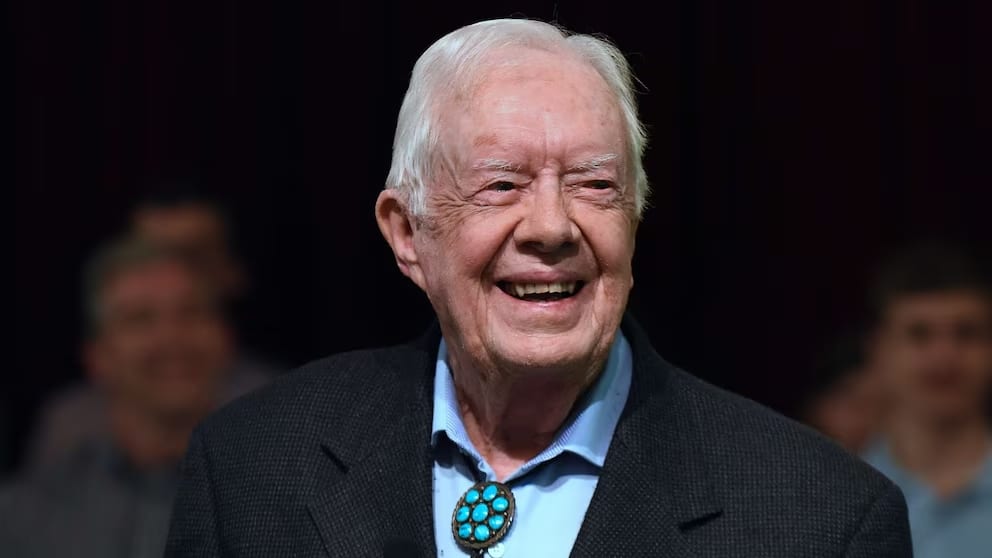Jimmy Carter, who gave new meaning to a former U.S. president’s role through decades of humanitarian work after his White House years, has died at 100. The Carter Center shared news of his passing, which ends the longest post-presidential chapter in American history.
The 39th President’s remarkable legacy includes the Camp David Accords and his Nobel Peace Prize-winning humanitarian work. Carter’s life story began as a peanut farmer in Plains, Georgia, led him to the White House, and ultimately made him a global champion for democracy and human rights. His dedication to public service shaped a remarkable century that saw him evolve from a one-term president into one of modern history’s most respected humanitarian leaders.
From Plains to Presidency
Jimmy Carter’s story to the presidency started in Plains, Georgia. His family’s peanut farming business became the foundation of his future leadership. Rural values and academic excellence shaped his early life. These qualities led to his acceptance at the United States Naval Academy in 1943.
Carter’s excellence showed at Annapolis where he graduated in the top ten percent of his class in 1946. Admiral Hyman Rickover picked him for the nuclear submarine program. Carter served as a senior officer for the pre-commissioning crew of the Seawolf. His promising military career changed direction in 1953 when his father died. He resigned his commission and went back to Plains to run the family’s peanut warehouse business.
Carter won the governorship in 1970 after serving in the Georgia State Senate. His campaign balanced racial issues at first. He surprised his supporters in his 1971 inaugural address by declaring “the time for racial discrimination is over”. His reforms as governor were significant. He consolidated about 300 state agencies into 22 and boosted African American staff in Georgia’s government by 25 percent. His team championed better education through the ‘Adequate Program for Education in Georgia’. This program funded vocational education and created smaller class sizes.
Carter saw his chance as a Washington outsider. He announced his run for president in December 1974 and began an innovative campaign. His strategy used the record number of state primaries to build momentum. A Georgia newspaper captured early doubts with the headline “Jimmy Who Is Running For What!?”. Carter’s approach worked. He won the Democratic nomination and beat incumbent President Gerald Ford in a close election. The final tally showed Carter with 50.1 percent of the popular vote and 297 electoral votes.
Presidential Triumphs and Challenges
Jimmy Carter’s presidency saw remarkable diplomatic wins alongside tough challenges at home that shaped his time in office. His administration’s greatest achievement in foreign policy came from intense peace talks in the Middle East.
Carter’s personal touch helped conclude the historic Camp David Accords that Egyptian President Anwar Sadat and Israeli Prime Minister Menachem Begin signed in September 1978. The president spent 13 days at Camp David working directly with both leaders to broker the first peace deal between Israel and an Arab nation. This breakthrough led to a bilateral peace treaty in March 1979 that transformed Middle East relations.
Carter tackled major economic problems at home, especially in energy policy. His team’s work cut foreign oil dependence from 48 percent to 40 percent during his term – a daily reduction of 1.8 million barrels. The newly created Department of Energy and the Energy Security Act pumped $20 billion into joint ventures with private industry. But OPEC’s decisions pushed oil prices from $13 to more than $34 per barrel, overshadowing these gains.
Carter’s presidency faced its biggest test at the time Iranian students took over 50 Americans hostage at the U.S. embassy in Tehran on November 4, 1979. The crisis dragged on for 444 days and crippled his administration’s ability to work effectively. A failed rescue attempt in April 1980 turned tragic when three helicopters broke down and a crash killed eight service members. The hostages finally walked free on January 20, 1981, just as Ronald Reagan took office.
Jimmy Carter started an unprecedented humanitarian trip after leaving the White House. He founded the Carter Center in 1982 with Emory University. His work beyond presidency transformed him from a one-term president to an international champion for peace and human rights.
The Carter Center’s peace programs reached countries of all sizes. The center observed 125 elections in 40 countries to strengthen democratic processes. Carter’s diplomatic efforts became vital in several international conflicts, including peace negotiations in Ethiopia, Eritrea, and the Korean Peninsula. He mediated disputes in Nicaragua, Panama, and Ethiopia, which showed his steadfast dedication to peaceful conflict resolution.
The Carter Center achieved remarkable public health outcomes under Carter’s guidance. The center reduced Guinea worm disease cases by 99.99 percent. Carter’s passion for affordable housing showed through his work with Habitat for Humanity. He and Mrs. Carter devoted their time each year since 1984 to build and improve homes. The Center built village-based healthcare systems throughout Africa and trained local personnel to distribute medicine and provide health education.
Carter received the Nobel Peace Prize in 2002 while President George W. Bush considered war with Iraq. The committee honored him “for his decades of untiring effort to find peaceful solutions to international conflicts, to advance democracy and human rights, and to promote economic and social development”. The Nobel Committee noted that Carter deserved the award earlier, especially for his 1978 mediation of the Egypt-Israel peace agreement. His acceptance speech highlighted his position not as a public official but as a citizen of a troubled world working toward peace, freedom, and human rights.
Personal Life and Character
Jimmy Carter’s personal character grew from his long-lasting marriage, deep religious beliefs, and his choice to live simply. These core values shaped his presidency and the way he approached public service and humanitarian work.
The Carters had the longest marriage in presidential history that lasted 77 years until Rosalynn passed away in November 2023. Their relationship went beyond a typical marriage. Carter often said, “Rosalynn was my equal partner in everything I ever accomplished”. Together, they showed their shared commitment to service through yearly work with Habitat for Humanity.
Carter’s Baptist faith guided every aspect of his public service and behavior. He taught Sunday school at Maranatha Baptist Church in Plains, Georgia even in his 90s. His religious beliefs shaped how he governed, but he made sure to keep church and state separate. He stopped the practice of having well-known pastors lead services in the White House. Carter put his faith into action. He believed Christians “are called to plunge into the life of the world and inject moral and ethical values into the processes of governing”.
Carter chose a modest life after his presidency. He turned down corporate board seats and paid speaking opportunities. He and Rosalynn stayed in their pre-presidency home and devoted their time to community service through the Carter Center. Their simple lifestyle showed in their daily habits. They took regular walks in their neighborhood and kept close bonds with their local community.
Jimmy Carter’s death marks the end of an extraordinary American trip that covered a century of public service, presidential leadership, and humanitarian work. A Georgia peanut farmer became a global peacemaker, showing the profound effect one person can have worldwide.
His lasting legacy reaches beyond his presidency. The Camp David Accords remain proof of his diplomatic skills in international relations. The Carter Center redefined how former presidents involve themselves with global issues. This led to major breakthroughs in disease prevention, election monitoring, and conflict resolution. The 2002 Nobel Peace Prize acknowledged his decades of service to humanity.
Faith, humility, and steadfast dedication to public service shaped Carter’s life. He shared a 77-year marriage with Rosalynn Carter. They lived modestly in Plains, Georgia and worked together for humanitarian causes. These values guided his life consistently. His remarkable trip from rural Georgia to worldwide recognition as a champion of peace and human rights has permanently marked American history and global humanitarian work. Carter’s passing signals more than just the end of an era. Future generations face the challenge to carry forward his legacy of service, compassion, and dedication to improving the world.




